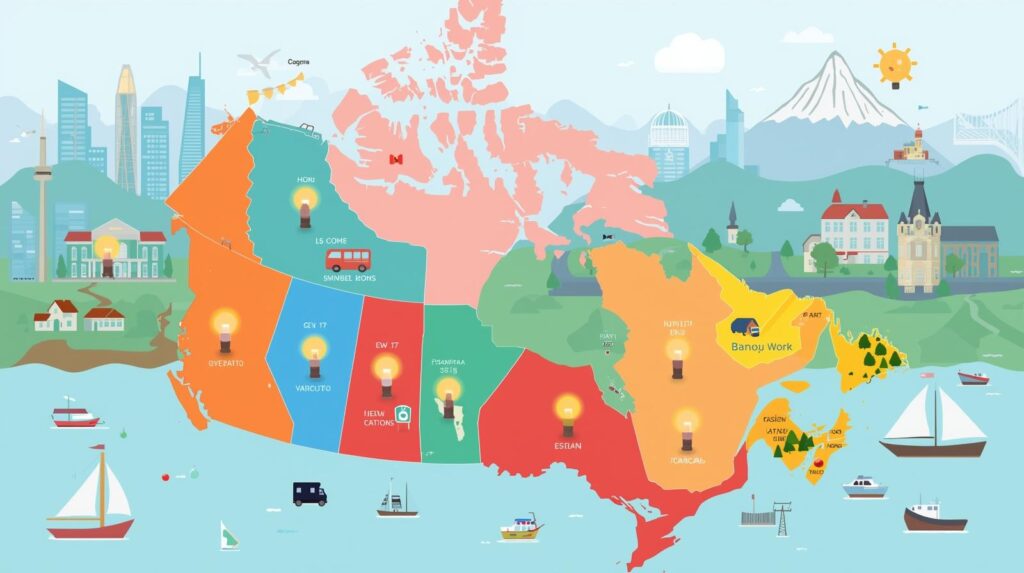Planning to move to Canada in 2025? One of the biggest questions newcomers ask is: “How much does it cost to live in Canada?”
The truth is, the cost of living in Canada depends heavily on the province and city you choose. For example, living in Toronto or Vancouver can be much more expensive than settling in Halifax or Winnipeg.
This guide will give you a clear, province-by-province breakdown of living costs in 2025—including housing, food, transport, healthcare, and more. Unlike government sites, we’ll explain things in plain language, with real numbers and practical tips, so you know exactly what to expect.
Why Understanding Cost of Living Matters in 2025
-
Helps you budget before moving to Canada.
-
Avoids financial stress during your first months.
-
Helps you choose the best province for affordability.
-
Determines whether your job offer salary is fair.
👉 Official resources like Statistics Canada provide raw data, but this article makes it easy to understand with examples and real insights.
Average Cost of Living in Canada (2025 Overview)
On average, a single person needs CAD $2,000–$2,800/month, excluding rent in high-cost cities. A family of four needs CAD $4,500–$6,500/month.
But these numbers change drastically across provinces. Let’s dive into province-wise details.
Province-wise Cost of Living in Canada (2025)
1. Ontario (Toronto, Ottawa, Mississauga)
-
Rent (1-bedroom in Toronto): $2,200–$2,700/month
-
Family apartment (3-bedroom): $3,500–$4,500/month
-
Monthly groceries (family of 4): $900–$1,100
-
Transport (Toronto transit pass): $156/month
-
Utilities (electricity, internet, heating): $250–$350
💡 Toronto and Ottawa are among the most expensive cities in Canada. A decent salary here should be at least CAD $70,000/year for a comfortable lifestyle.
2. British Columbia (Vancouver, Victoria, Surrey)
-
Rent (1-bedroom Vancouver): $2,300–$2,800
-
Family apartment: $3,800–$4,800
-
Groceries (family of 4): $950–$1,200
-
Transport (monthly pass Vancouver): $156
-
Utilities: $250–$350
💡 Vancouver is beautiful but pricey. Many newcomers choose Surrey or Burnaby for slightly lower rent.
3. Alberta (Calgary, Edmonton)
-
Rent (1-bedroom Calgary): $1,400–$1,700
-
Family apartment: $2,200–$2,800
-
Groceries (family of 4): $800–$1,000
-
Transport pass: $112–$120
-
Utilities: $200–$280
💡 Alberta has no provincial sales tax, making it cheaper than Ontario or BC. Great choice for families looking for savings.
4. Manitoba (Winnipeg)
-
Rent (1-bedroom): $1,100–$1,300
-
Family apartment: $1,700–$2,200
-
Groceries (family of 4): $750–$950
-
Transport pass: $105
-
Utilities: $180–$250
💡 One of the most affordable provinces for newcomers. Winnipeg offers cheaper housing compared to other major cities.
5. Saskatchewan (Regina, Saskatoon)
-
Rent (1-bedroom): $1,000–$1,200
-
Family apartment: $1,600–$2,000
-
Groceries (family of 4): $750–$900
-
Transport pass: $100–$120
-
Utilities: $180–$250
💡 Cost of living is low, but job opportunities are fewer compared to Ontario or BC.
6. Quebec (Montreal, Quebec City)
-
Rent (1-bedroom Montreal): $1,200–$1,500
-
Family apartment: $1,900–$2,600
-
Groceries (family of 4): $800–$1,000
-
Transport pass (Montreal): $97
-
Utilities: $180–$250
💡 Quebec is affordable, but French language skills are often required for jobs.
7. Atlantic Canada (Nova Scotia, New Brunswick, Newfoundland & PEI)
Halifax (Nova Scotia):
-
Rent 1-bedroom: $1,400–$1,700
-
Family apartment: $2,200–$2,800
-
Groceries: $800–$950
-
Transport: $82
-
Utilities: $180–$240
St. John’s (Newfoundland):
-
Rent 1-bedroom: $1,100–$1,400
-
Family apartment: $1,800–$2,400
-
Groceries: $750–$900
-
Transport: $78
-
Utilities: $180–$240
💡 Atlantic provinces offer lower rent and living costs, but salaries are also lower compared to Toronto or Vancouver.
8. Territories (Yukon, Northwest Territories, Nunavut)
-
Rent (1-bedroom): $1,600–$2,200
-
Family apartment: $2,500–$3,200
-
Groceries: $1,200–$1,500 (food is more expensive due to shipping costs)
-
Transport: Minimal public transport, most use cars
-
Utilities: $300+
💡 The North is costly but offers higher salaries and incentives for workers willing to move there.
Province-wise Cost Comparison Table (2025)
| Province | 1-Bedroom Rent | Family Apartment | Groceries (Family of 4) | Transport Pass | Utilities |
|---|---|---|---|---|---|
| Ontario | $2,200–$2,700 | $3,500–$4,500 | $900–$1,100 | $156 | $250–$350 |
| BC | $2,300–$2,800 | $3,800–$4,800 | $950–$1,200 | $156 | $250–$350 |
| Alberta | $1,400–$1,700 | $2,200–$2,800 | $800–$1,000 | $112 | $200–$280 |
| Manitoba | $1,100–$1,300 | $1,700–$2,200 | $750–$950 | $105 | $180–$250 |
| Saskatchewan | $1,000–$1,200 | $1,600–$2,000 | $750–$900 | $100 | $180–$250 |
| Quebec | $1,200–$1,500 | $1,900–$2,600 | $800–$1,000 | $97 | $180–$250 |
| Atlantic Canada | $1,100–$1,700 | $1,800–$2,800 | $750–$950 | $78–$82 | $180–$240 |
| Territories | $1,600–$2,200 | $2,500–$3,200 | $1,200–$1,500 | Minimal | $300+ |
Common Mistakes Newcomers Make
❌ Underestimating rent in big cities (Toronto/Vancouver).
❌ Forgetting about hidden costs like insurance, phone bills, childcare.
❌ Not checking if salary matches cost of living in that province.
❌ Thinking rural areas are always cheaper (sometimes groceries are higher due to transport costs).
Pro Tips for Saving Money in Canada
✅ Choose mid-sized cities (like Calgary, Winnipeg, Halifax) for balance between jobs and affordability.
✅ Use public transport instead of owning a car (saves $500–$800/month).
✅ Shop at discount grocery stores (No Frills, Walmart, Costco).
✅ Share accommodation for the first 6–12 months.
FAQs – Cost of Living in Canada 2025
1. Which province is the cheapest to live in Canada 2025?
Saskatchewan and Manitoba are the most affordable, especially for housing.
2. Which province is the most expensive?
Ontario (Toronto) and British Columbia (Vancouver).
3. How much do I need to live comfortably in Canada as a single person?
Around CAD $2,000–$2,800 per month, depending on province and lifestyle.
4. How much should a family of four budget monthly?
CAD $4,500–$6,500 per month in most provinces, higher in Toronto/Vancouver.
5. Do salaries match the cost of living?
Yes, but it depends. Alberta and Saskatchewan offer lower costs with decent salaries. In Toronto and Vancouver, high salaries are often balanced out by high rent.
Final Thoughts
The cost of living in Canada in 2025 varies widely:
-
Ontario & BC = Expensive but more job opportunities.
-
Alberta & Manitoba = Affordable, family-friendly.
-
Quebec = Cheaper housing but French is often required.
-
Atlantic Canada = Budget-friendly but fewer jobs.
👉 Before moving, calculate your monthly budget vs. expected salary in that province. This will help you make a smarter choice and avoid surprises.
If you’re planning your move, also check out our detailed guides on Canadian jobs in 2025 and Express Entry immigration programs



